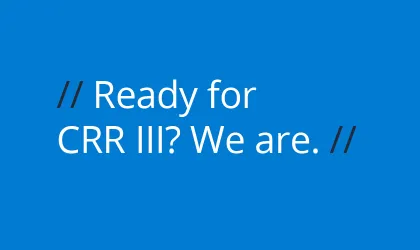Trends and predictions on risk management in 2022
An interview by FinAPU founder Karl Tasch with Validatis - a division of Bundesanzeigerverlag
Saporito: Mr. Tasch, which trends have had a significant influence on risk management in recent times?
Tasch: In recent years, progressive regulation and greater data availability have had a positive influence on risk management. Isolated risk approaches are increasingly being replaced by holistic, multi-topic models. As well as this, increasingly faster computing power and online connections make these kinds of holistic risk systems possible in the first place.
Saporito: Now that it's been accelerated by the pandemic, what impact does digitalisation have on the processes in the area of Risk & Compliance?
Tasch: We could observe several effects here. The demands in terms of browser availability and their ability to run on a wide variety of systems have risen hugely. As a result of many employees now working from home, we're seeing increased use of the online workflow and confirmation process. At the very least we saw a doubling of the electronic confirmation process here. In the same way, there was an increasing connection of FinAPU to our customers’ core systems. There are more and more extensive interfaces that mostly communicate on both sides.
Saporito: The media are reporting on new financial scandals almost daily. How important are valid data and smart digital tools to counteract these?
Tasch: Thanks to digital transformation and increasingly valid, timely data, several promising perspectives are emerging to counteract these kinds of scandals. The digital tools help make employees’ lives easier. Simple, repetitive tasks are increasingly performed by algorithms, and intelligent process flows also support risk management. They provide employees with more space and time to apply their actual competencies such as analytical thinking, evaluation capability and communication skills. Audit-proof documentation by means of the workflow, as well as control focused on processes, data and systems, increase the quality of risk management and minimise sources of error. On top of this, the installed early warning systems support risk management.
Saporito: Currently, sustainability is an essential aspect of successful companies and a term that a lot of them are just using as a convenient embellishment. Is it possible to measure and evaluate sustainability?
Tasch: Sustainability must be an integral part of risk management and it must be woven into the fabric of the company like a "green thread". In many companies we're seeing sustainability and risk management isolated from each other, but we need a combination of both of them. Many databases allow a modular and dynamic approach to the development of customised sustainability management systems. But most of all it's the algorithms behind these databases and the visualisation developed from them that increases acceptance among staff. This means that the overarching goal must be the unique combination of sustainability issues with risk management. With FinAPU, we integrate this into the rating process, which means that sustainability has an influence on the default probabilities. Toxic issues (e.g. child labour, water waste, etc.) can be defined, and then they’re automatically taken into account in the workflow process. Only innovative risk management of this kind makes it possible for sustainability to be measured and evaluated.
Saporito: Let's take a look into the future. What developments do you expect in the field of risk management in the next two years?
Tasch: I see massive progress on the technical level. Databases and programmes are becoming more and more stable and intelligent. Increased computing power means that increasingly extensive data can be evaluated in even more sophisticated algorithms. More and more data sources can be linked to create a holistic picture. Increasingly fast internet connections are also a strong driver for this. In addition, sustainability will become an integral part of risk management and will have an increasing impact on the evaluation and results of companies.
Vita:
Karl Tasch is an experienced risk analyst and risk management expert. He is the founder of FinAPU, and the tool he developed allows companies from various sectors as well as negotiating and business partners to be evaluated on a daily basis, potential risks to be identified and strategic action alternatives to be derived. One focus of his work is to make ESG sustainability-related areas of responsibility a focus of corporate risk management and integrate them into the daily workflow.




